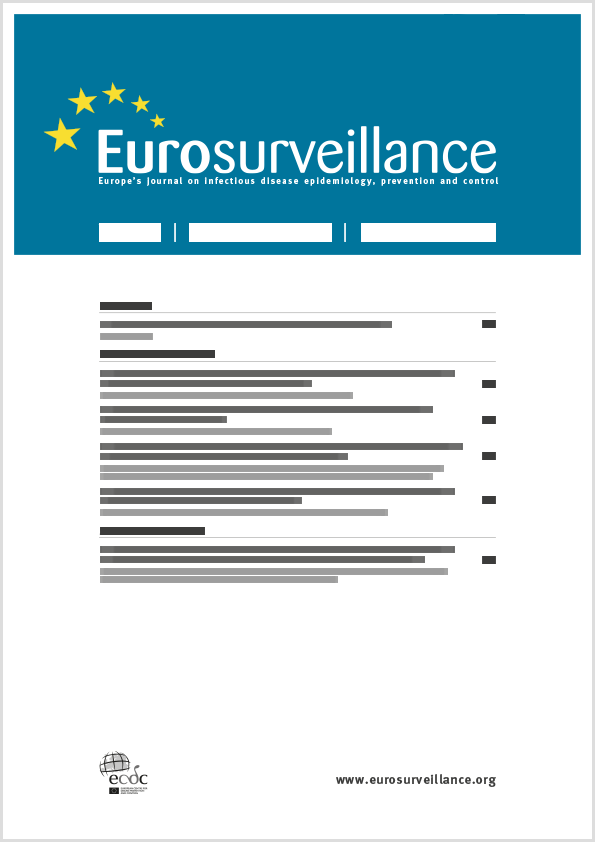- Home
- Eurosurveillance
- Previous Issues
- Volume 21, Issue 5, 04/Feb/2016
Eurosurveillance - Volume 21, Issue 5, 04 February 2016
Volume 21, Issue 5, 2016
- Rapid communication
-
-
-
Confirmed inguinal lymphogranuloma venereum genovar L2c in a man who had sex with men, Slovenia, 2015
More LessA laboratory-confirmed lymphogranuloma venereum (LGV) case in Slovenia was reported in 2015, in a human immunodeficiency virus (HIV)-negative man presenting with inguinal lymphadenopathy. He reported unprotected insertive anal intercourse with two male partners in Croatia. Variant L2c of Chlamydia trachomatis was detected in clinical samples. Although the patient was eventually cured, the recommended treatment regimen with doxycycline had to be prolonged.
-
-
-
Emergence of influenza A(H1N1)pdm09 genogroup 6B and drug resistant virus, India, January to May 2015
More LessTo investigate the aetiology of the 2015 A(H1N1)pdm09 influenza outbreak in India, 1,083 nasopharyngeal swabs from suspect patients were screened for influenza A(H1N1)pdm09 in the state of Madhya Pradesh. Of 412 positive specimens, six were further characterised by phylogenetic analysis of haemagglutinin (HA) sequences revealing that they belonged to genogroup 6B. A new mutation (E164G) was observed in HA2 of two sequences. Neuraminidase genes in two of 12 isolates from fatal cases on prior oseltamivir treatment harboured the H275Y mutation.
-
- Top
-
- Research article
-
-
-
Evaluation of a temporary vaccination recommendation in response to an outbreak of invasive meningococcal serogroup C disease in men who have sex with men in Berlin, 2013–2014
More LessMeningococcal serogroup C (MenC) vaccination of men who have sex with men (MSM) was temporarily recommended to control an outbreak of invasive MenC disease among MSM in Berlin in 2012–2013. Vaccination was offered to HIV-infected MSM free of charge; others had to request reimbursement or pay out of pocket. We aimed to assess (i) awareness and acceptance of this recommendation through an online survey of MSM, (ii) implementation through a survey of primary care physicians and analysis of vaccine prescriptions, and (iii) impact through analysis of notified cases. Among online survey respondents, 60% were aware of the recommendation. Of these, 39% had obtained vaccination (70% of HIV-infected, 13% of HIV-negative/non-tested MSM). Awareness of recommendation and vaccination were positively associated with HIV infection, primary care physicians’ awareness of respondents’ sexual orientation, and exposure to multiple information sources. Most (26/30) physicians informed clients about the recommendation. Physicians considered concerns regarding reimbursement, vaccine safety and lack of perceived disease risk as primary barriers. After the recommendation, no further outbreak-related cases occurred. To reach and motivate target groups, communication of a new outbreak-related vaccination recommendation should address potential concerns through as many information channels as possible and direct reimbursement of costs should be enabled.
-
- Top
-
- Euroroundup
-
-
-
European public health policies for managing contacts of invasive meningococcal disease cases better harmonised in 2013 than in 2007
More LessIn 2007, a European survey identified variation in country policies on public health management of invasive meningococcal disease (IMD). In 2009–10, the European Centre for Disease Prevention and Control (ECDC) published evidence-based guidance on IMD. We therefore surveyed again European countries to describe policies for managing IMD cases and contacts in 2013. We asked national IMD public health experts from 32 European countries to complete a questionnaire focusing on post-exposure prophylaxis (PEP) for IMD contacts and meningococcal vaccination. Proportions in 2007 and 2013 were compared using the chi-squared test. All 32 countries responded, with responses from two regions for Belgium and Italy; half stated having used ECDC guidance to update national recommendations. PEP was recommended to close contacts in 33 of 34 countries/regions, mainly ciprofloxacin for adults (29/32 countries) and rifampicin for children (29/32 countries). ECDC guidance for managing IMD contacts in airplanes was strictly followed by five countries/regions. Twenty-three countries/regions participated in both surveys. Compared with 2007, in 2013, more countries/regions recommended i) ceftriaxone for children (15/23 vs 6/20; p = 0.03), ii) PEP for all children in the same preschool group (8/23 vs 17/23; p = 0.02). More countries/regions recommended evidence-based measures for IMD public health management in 2013 than 2007. However, some discrepancies remain and they call for further harmonisation.
-
- Top
-
- News
- Miscellaneous
- Author's correction
-
Volumes & issues
-
Volume 30 (2025)
-
Volume 29 (2024)
-
Volume 28 (2023)
-
Volume 27 (2022)
-
Volume 26 (2021)
-
Volume 25 (2020)
-
Volume 24 (2019)
-
Volume 23 (2018)
-
Volume 22 (2017)
-
Volume 21 (2016)
-
Volume 20 (2015)
-
Volume 19 (2014)
-
Volume 18 (2013)
-
Volume 17 (2012)
-
Volume 16 (2011)
-
Volume 15 (2010)
-
Volume 14 (2009)
-
Volume 13 (2008)
-
Volume 12 (2007)
-
Volume 11 (2006)
-
Volume 10 (2005)
-
Volume 9 (2004)
-
Volume 8 (2003)
-
Volume 7 (2002)
-
Volume 6 (2001)
-
Volume 5 (2000)
-
Volume 4 (1999)
-
Volume 3 (1998)
-
Volume 2 (1997)
-
Volume 1 (1996)
-
Volume 0 (1995)
Most Read This Month

-
-
Detection of 2019 novel coronavirus (2019-nCoV) by real-time RT-PCR
Victor M Corman , Olfert Landt , Marco Kaiser , Richard Molenkamp , Adam Meijer , Daniel KW Chu , Tobias Bleicker , Sebastian Brünink , Julia Schneider , Marie Luisa Schmidt , Daphne GJC Mulders , Bart L Haagmans , Bas van der Veer , Sharon van den Brink , Lisa Wijsman , Gabriel Goderski , Jean-Louis Romette , Joanna Ellis , Maria Zambon , Malik Peiris , Herman Goossens , Chantal Reusken , Marion PG Koopmans and Christian Drosten
-
- More Less


